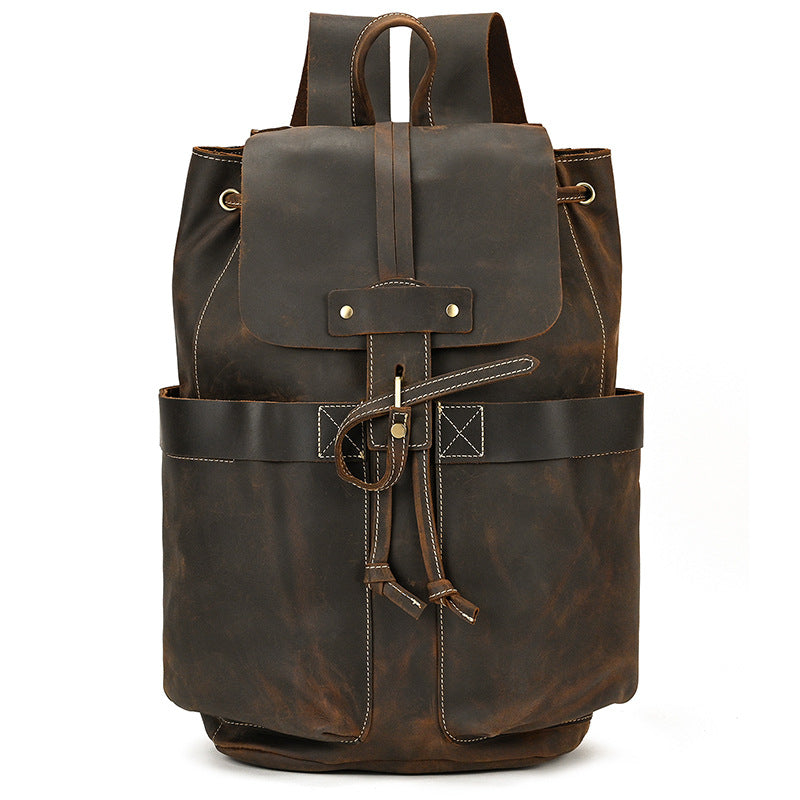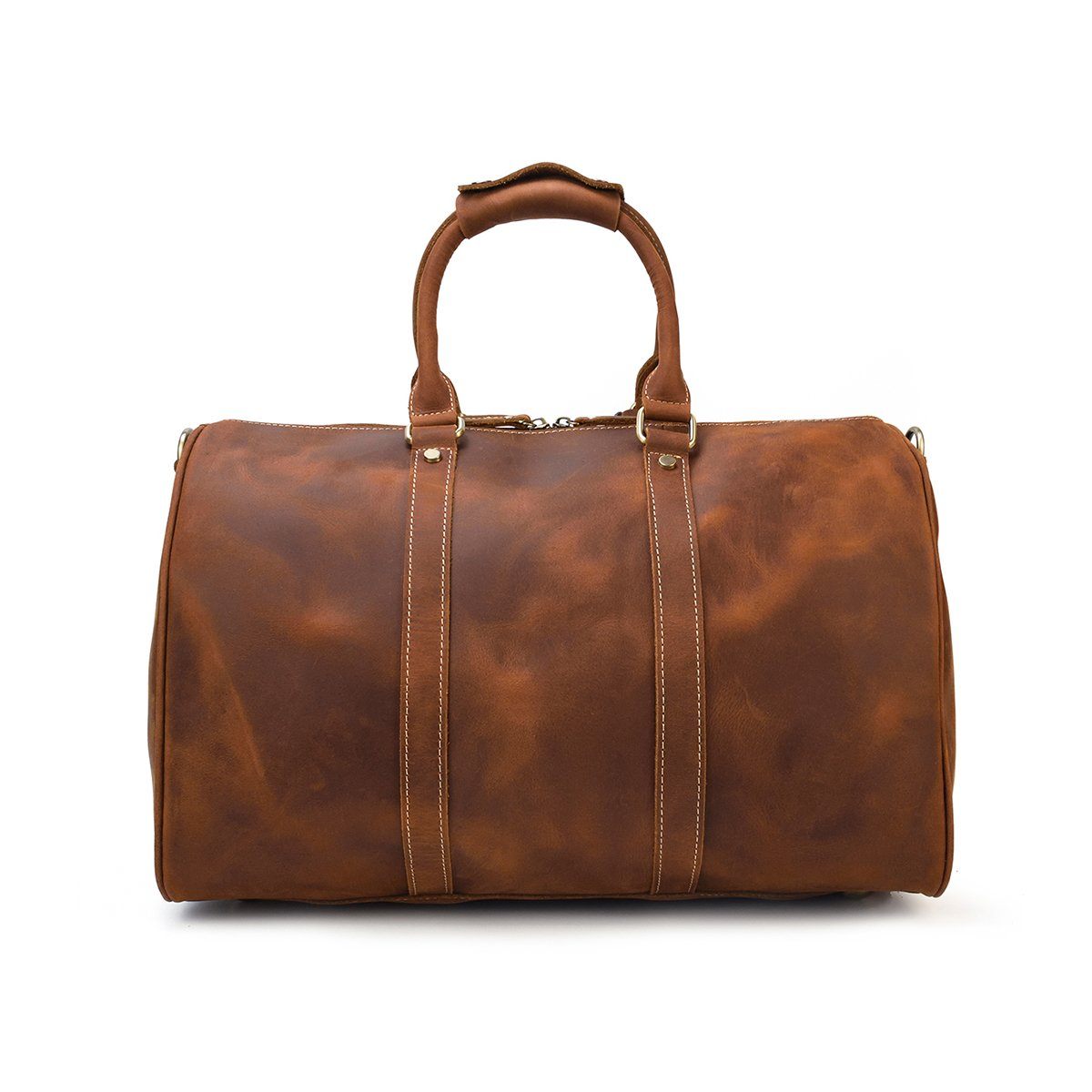
What is Nappa Leather? A Luxury Real Leather Type
Reading Time: about
Nappa leather is a world-renowned and famous leather in the leather world in general, named after the Napa Valley in California. Undergoing a unique tanning process, it is one of the softest and most supple leathers on the market. Like an ox fillet, it is one of the best pieces of animal hide, offering an exceptional leather.
Nappa leather is worked primarily with cowhide, but it is not uncommon to work with calf, goat or lamb, always taking care to select the top part of the hide, which is softer and more durable. Sometimes written as "Napa", this full grain leather is used in a variety of industries, including luxury automobiles.
In this article, we will take a closer look at what nappa leather is, its origins, its main characteristics, its daily use and its maintenance. If you have already heard of nappa leather, or are curious about it, you will find all the information you need in this guide.
Summary
- 1. What Is Nappa Leather?
- Where does the term Nappa leather come from?
- Who invented Nappa leather?
- What is Nappa leather in concrete terms?
- Should we say "Nappa" or "Napa" Leather?
- 2. How Nappa Leather is Made?
- 3. What are the Pros and Cons of Nappa Leather?
- 4. What is Nappa Leather Used for?
- 5. How to Clean & Care for Nappa Leather?
- How to clean nappa leather?
- How to care for nappa leather?
- How to waterproof nappa leather?
- How to repair a scratch on nappa leather?
- How to repair a tear in nappa leather?
- Wrapping Up
What Is Nappa Leather?
📷 Credit: OA Leather Supply's Youtube Channel
Where does the term Nappa leather come from?
Nappa" or "Napa" leather takes its name from the place where it was first discovered: the Napa Valley in California (USA). This region has long been inhabited by two native tribes, the Wappo and the Patwin. It is believed that the term "Nappa" comes from the English pronunciation of a Native American term. This term inspired the name of the city of Napa founded in 1847, while the place was previously spelled Nappa with two "p".
Who invented Nappa leather?
History tells us that the first piece of Nappa leather was first discovered by Emanuel Manasse, a German worker, son of a tanner, in 1875, at the Sawyer Tanning Company. He then called this leather "Nappa leather" in reference to his workplace. The term flourished as Manasse and the Sawyer Tanning Company became partners in the manufacturing of Nappa leather.
What is Nappa leather in concrete terms?
Nappa leather has the peculiarity of having no fixed specifications, no distinctive characteristics or clear process to recognize it. Therefore, it is commonly used to designate a soft, smooth and flexible leather but it can have a natural grain or be corrected and can come from cow, calf, lamb or other skins.
This ambiguity and lack of standardization and/or codification creates a blur in the minds of consumers, leading brands to sometimes present fake leathers, or leathers of lesser quality, such as nappa leather. The term Nappa in the collective mind therefore refers mainly to a particularly soft or supple leather.
Sometimes corrected grain leather or crocodile leather is sold as nappa leather. But crocodile leather is known for its strength, not its softness. Many misleading descriptions of Nappa leather make it a misunderstood leather. What you need to keep in mind when talking about this leather is that it can have different origins, thicknesses, grains, finishes and colors but that it is a full grain leather, unsanded (only the hairs are removed), remarkably smooth and supple.
Today, Nappa leather is mainly found in the luxury car industry, offered on models of renowned brands such as Porsche, BMW or Audi. The interior is often made of Napa leather (not always), and when this is the case, not all surfaces are necessarily Nappa leather. Are you beginning to understand why it's easy to get lost?
Should we say "Nappa" or "Napa" Leather?
As we have just discovered, Nappa leather comes from the Napa Valley region of California. One could therefore legitimately think that the spelling "Napa" is legitimate. It is indeed used today, as is the spelling "Nappa". Why is that?
Nappa was the term commonly used before the creation of the City of Napa in the mid-19th century. This term has remained popular, implicitly or not, and is now the primary and most common way to refer to this type of leather.
In any case, this denomination does not designate a precise and standardized type of leather but an aspect of full grain leather. Whether it is spelled with one "p" or two "p's" has no real impact. In any case, people will probably know what you are talking about (provided they know the term of course).
How Nappa Leather is Made?
Let's take a look at how Nappa leather is made, in its most common form, which is a full grain cowhide. This Nappa leather is very little worked before its treatment. The hair is simply removed to obtain a smooth surface, but the original texture and markings are often retained as much as possible.
It is not corrected or sanded, so the final result may have imperfections, but this does not imply poor quality. It can happen, if lesser quality leathers are used as a top grain leather, that the surface is polished to obtain a smooth and harmonious result. Like the vast majority of natural leathers on the market, Nappa leather comes from cowhide, but it is not uncommon to find other types of leather such as:
- Lamb
- Calf
- Goat
According to experts, the main difference between Nappa leather and other genuine leathers, lies mainly in its unique tanning process. It is this process that gives Nappa leather its soft and supple characteristics.
The tanning of Nappa leather is a mineral tanning and is therefore carried out with the help of chromium sulfate or aluminum. While tanning is a complex process that can involve twenty steps and last from a few days to a few months depending on the techniques used, chrome tanning takes only a few days and produces soft and flexible leather.
During chrome tanning, soluble dyes are sometimes added to allow Nappa leather to offer more resistant colors and less subject to fading over time. In fact, mineral tanning allows the leather to retain and set the colored dyes more easily. This original process makes the leather easy to clean and maintain in general.

ITHYA | Full Grain Leather Backpack
What are the Pros and Cons of Nappa Leather?
Like all types of leather, nappa leather has advantages but also disadvantages that you should keep in mind when making your purchase to make an informed decision.
The Pros of Nappa Leather
Here are the main advantages of nappa leather:
- ✔ Nappa leather is a very soft and extremely supple leather unlike some "hard" leathers.
- ✔ Nappa leather retains its integrity and reacts well to tension/torsions, so it does not wrinkle
- ✔ Nappa leather is a full grain leather of superior quality. It is therefore resistant and durable over time, not easily damaged
- ✔ Nappa leather is a leather with little work, allowing to keep the breathing capacity of the skin in order to let the leather breathe in time, avoiding the accumulation of humidity, which can damage the leather and/or allow the development of fungus for example.
- ✔ Nappa leather is a natural leather of first quality, and develops over the years, a beautiful patina so appreciated and sought after by lovers of natural leather objects.
- ✔ Nappa leather, due to its low transformation is a hypoallergenic leather.
The Cons of Nappa leather
Here are the main disadvantages of nappa leather:
- ✖ Nappa leather is a quality leather which is not very affordable and is therefore reserved for the wealthy. It is for example used in the fitting out of luxury or high-end vehicles.
- ✖ Nappa leather is a material that does not manage temperature well. Cold in winter and hot in summer, it can cause discomfort in terms of temperature management, especially for clothing or furniture on which we sit.
- ✖ Nappa leather is a strong material but its porosity makes it a sensitive material that easily retains traces of its use. If you scratch it or spill a liquid on it, it will be more difficult to get rid of the trace permanently than a lesser quality leather.
📷 Credit: OA Leather Supply's Youtube Channel
What is Nappa Leather Used for?
Nappa leather is a "rarely" used leather, when compared to its counterparts such as full grain leather, genuine leather or even some artificial alternatives (such as PU leather or bonded leather). It is confined to specific areas, often luxurious, including the field of furniture, car interiors or some fashion items (with manufacturers like Coach, Prada or Gucci):
- gloves
- belts
- hats
- bags, purses and briefcases
- wallets and card holders
- toiletry bags
- shoes
- jackets
- cases
Nappa leather can be found in luxury sedans such as Audi, BMW, Mercedes or Porsche, their texture and softness being easily assimilated to the cylinders of these chic brands, especially in the car seat covers. This type of upholstery is highly sought after and especially appreciated by demanding luxury car enthusiasts.
No matter the field, the luxury aspect is always present, showing the quality of this type of leather and its consideration on the market.

How to Clean & Care for Nappa Leather?
A leather like nappa leather deserves to be treated with care. And to be honest, it will pay off well over time. Being a natural leather that can be worked, it is subject to changes over the seasons, depending on your use and living conditions. It is therefore important to accompany it over time to get the most out of it, both in terms of cleaning and maintenance.
It is often said that it is better to be safe than sorry. Use your object with care and its maintenance will be easier. When not in use, store it in a dry, dust-free, ventilated area at room temperature, possibly away from direct sunlight. This allows the leather to breathe and prevents the development of mold or mildew, a process that often occurs when moisture develops in sealed rooms. This natural process can cause considerable damage to the leather, leading to wrinkles and cracks.
Do not hesitate to store it in a cotton bag (breathable) to protect it from scratches and cuts, which can be caused by surrounding objects.
📷 Credit: SHIFTD Garage's Youtube Channel
How to clean nappa leather?
Simplicity is the name of the game when it comes to premium materials. A soft, smooth, slightly damp cloth will do just fine to remove dust and other imperfections. Be careful not to get it too wet, as you risk staining the leather, especially if it is not dyed and treated. Don't worry though, leather is a living material that will dry, and you will need a good dose of water before staining the leather. It is however advised, for an optimal cleaning, not to soak the cloth during the washing.
If after this first pass, you notice that some marks are resistant and/or deeper, then a specific leather cleaner may be a wise solution. For nappa leather, we always recommend using a soap specialized for soft leathers in order to avoid damaging the natural and fragile fibers of the leather. Be sure to dab the stains - do not rub them.
How to care for nappa leather?
Nappa leather being a soft and supple natural leather, its fibers tend to dry out more easily over time, which can lead to the appearance of wrinkles or cracks on the finished product, altering its texture and feel. It is therefore essential to provide it with the necessary ingredients to keep it in good condition over time, and on a regular basis if you want to maintain its integrity over time.
Before applying a treatment to the leather, it is essential to wash it properly so that the treatment is effective and the protection optimal. There are different types of conditioners but the most common ones are in the form of:
- oil
- cream
- wax
Simply apply your conditioner to the surface of the leather with a smooth, soft cloth in small concentric circles, then gently allow it to nourish itself by absorbing the conditioner. You will quickly notice a change, as the leather becomes softer, more flexible and also more pleasant to the touch. Don't hesitate to wipe off any excess conditioner with the cloth.
If you wish, but this is optional, you can apply a top coat that will protect the leather against water and scratches. Be careful though, this additional surface may change the natural look and texture of the nappa leather, which may be unpleasant. From our side, we recommend a regular cleaning and maintenance in order to obtain the best results.

AYA | Full Grain Leather Backpack
How to waterproof nappa leather?
As we have just seen, this is not the option we prefer, but as a matter of principle, it seems right to mention it. It can even be useful if you live in risky areas, that is to say particularly humid, for example, or if you know that your object will often be subjected to conditions that could damage its integrity.
Waterproofing always comes after a thorough cleaning and conditioning of the leather. From there, you can apply your waterproofing product, whether it is a natural (wax) or artificial (acrylic) product. Note that the thicker the product, the more difficult it will be to reach the leather, both for water and for you.
How to repair a scratch on nappa leather?
Removing a scratch on nappa leather is quite simple if it is superficial. If it is the case, just rub it to make it disappear. If it does not go away or if residual traces remain, apply a little vegetable oil to nourish the leather fibers, let the leather soak in and then repeat the action.
If the scratch still does not go away, it means that the damage is more important than expected and that the scratch is deep, having torn a significant number of fibers in the leather, that a simple polishing could not repair. In this case, there are specialized repair kits on the market, including a paste called "filer", which fills the scratch to make it disappear. The color of this paste varies of course and you can easily choose the tone that best suits your product. Once applied, let the paste dry and then polish it to give your product a natural look.
How to repair a tear in nappa leather?
Tears are a much more important problem, which must be treated with care and professionalism or you will have a damaged product for life. Please note that in all cases, your product will retain marks, albeit sometimes discreet, from this type of repair.
There are different methods, depending on the severity of the tear. If the tear is relatively small, the use of a leather glue will do the trick. Choose a color similar to your leather or consider staining it once dry with acrylic paint (flexible and more durable on leather).
If the tear is too big, you'll either have to call in a cobbler or hang up your best needle and some thin but sturdy thread to sew the tear yourself. You can imagine the solution we recommend.
Wrapping Up
Nappa leather is a soft, supple, full grain natural leather that has built its reputation through its use in the luxury furniture and automotive industries. With no clear typology or method of recognition, it can be difficult to navigate the world of nappa leather, but its texture and softness are key clues that highlight the quality of this full grain leather.
📫 Related Blog Posts:
📌 How to Soften Leather? Breathe New Life Into Your Favorite Leather Items
📌 Flannel vs Plaid Pattern | The Definitive Guide
📌 Cactus Leather: Does it Live Up to the Hype?
📌 Faux Leather: Discovering Alternatives to Real Leather
📌 What Is Vachetta Leather? Louis Vuitton's Sophisticated Leather
📌 Human Leather | The Secrets of a Controversial Material
📌 What is Upholstery Leather? [A Comprehensive Guide]
📌 How to Clean Mold Off Leather? [Step-by-Step Guide]
📌 What is Cross Grain Leather?
📌 What is Genuine Leather? [An In-Depth Guide]
📌 How to Stretch Leather Shoes? An Extensive Guide to Comfortable Footwear





















Leave a comment